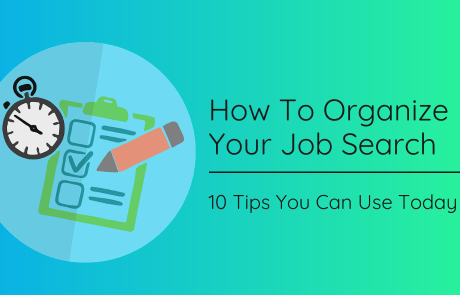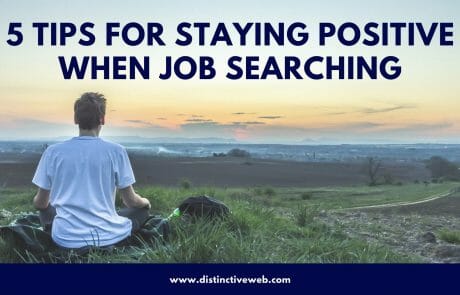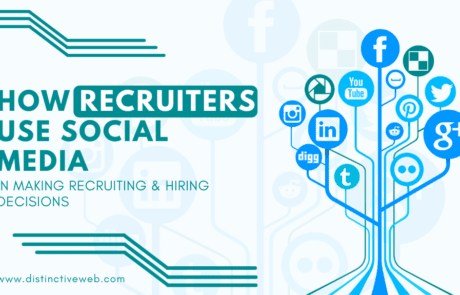
Is a robust social media presence helpful when job searching? The answer is an indisputable YES.
Recruiters. Whether in-house HR recruiters or third-party recruiting firms, many employers use them, rely on them, depend on them to source the best available candidates for job openings.
Recruiters are constantly on the lookout for the ideal candidate for each position and your goal as a job seeker is to make sure you can be found if you are the perfect fit for that position.
Want recruiters to find you? If you’ve got a great reputation and are especially well-known in your field, you stand a slightly better chance of being “discovered.” If, however, you’re a more typical professional who no one outside of your immediate sphere of influence knows about, not so much. Anonymity is doom to professional advancement.
And there’s no better way to maintain your anonymity than to have no social media presence. But, not just any presence. After all, if 2020 taught us anything it is that a social media presence can be quite negative if we let it.
Rather, in a professional context, I’m referring to a positive, professional persona on social media that promotes your personal brand and area of expertise, gets you noticed, and effectively sells your potential.
How do you build a social media presence that makes it easy for recruiters to find you? Keep reading to discover the lowdown on recruiters’ social media usage and how you can reverse engineer the process to improve your recruitment chances.
Where To Build Your Social Media Presence
The world’s largest professional social media juggernaut has slowed down in terms of recruitment, but it still leads at 72%, according to the Jobvite Recruiter Nation Report of 2020. LinkedIn shows why it’s still the gold standard as it clocks in at 67% in terms of candidates’ quality.
How recruiters are using it: they will search for keyword combinations of hard skills and job titles to find their candidates. They input the relevant keywords into LinkedIn’s search, essentially the same as an applicant tracking system, to narrow down the field. Once they land a potential candidate, they will scrutinize their profile further.
How candidates can use it: since most recruiters use LinkedIn, spend maximum time polishing your social media presence on LinkedIn by optimizing your profile and increasing your engagement and online networking on LinkedIn.
Seeing as LinkedIn utilizes digital technology, it offers other benefits over your traditional resume, such as the endorsement and recommendation features. You can get testimonials from former customers, employers, or well-known colleagues. Doing so will improve your credibility and help you build a positive social media presence.
Every week, LinkedIn makes a report on the number of search appearances you popped up in. On clicking it, you can view their job titles to confirm if your profile appears in relevant job searches. Delete terms that make your profile appear in wrong searches and add keywords and skills that would ensure you appear in desirable searches.
The real trick is finding out the hard skills recruiters search for in job descriptions and applicant tracking systems. For this, research job listings in your industry to find out what recruiters are looking for, and tailor not just your resume but your LinkedIn profile to match those job descriptions.
Location, complete educational profiles, measurable results, and the number of connections you have may also play a big part in how highly you rank on searches.
Oh, don’t forget to turn on the toggle that lets recruiters know you are open to work.
While it has its flaws, Facebook remains the most popular social media site and second most popular site for recruiters at 60%, according to Jobvite. However, candidates’ quality takes a massive nosedive at 34%, which a creative candidate can exploit to their advantage.
Recruiters: can run ads that target education, locality, interests, and job titles. After that, they can look at the engagement of shortlisted candidates. Alternatively, they can conduct background searches to find the right fit.
Facebook works best for recruiters looking for blue-collar, entry, and mid-level jobs in sales and marketing, retail, and health care. Recruiters are also known to target groups that contain job boards in their industry.
Candidates: to improve your chance of landing a job on Facebook, you can:
- Optimize your Facebook profile
- Search and apply for existing positions
- Build your network by joining relevant job boards and groups
- Include presentations, testimonials, and endorsements in your profile
- Follow and engage with companies and individuals who could potentially hire you, so they see the value you might offer.
Hardly the first name you would associate with jobs, but Instagram is the fastest growing social media platform for job recruitment as it grew from 18% in 2017 to 37% in 2020. This makes it an excellent platform to be part of your overall plan to build your social media presence.
Recruiters: will place relevant hashtags in their job listings, including location. Additionally, recruiters can search using hashtags and locations to narrow down the candidate search. Recruiters tend to use industry-specific hashtags such as:
- #marketingmanager
- #contentwriter
- #virtualassistantjobs
For candidates: use searchable hashtags to find open jobs. Some popular hashtags include:
- #remotejobs
- #jobsearch
- #jobsearchtips
- #jobsearching
Analyze the job openings to get a clue on what employers are looking for. Make your Instagram page public and tailor your content in line with the recruiters’ wish list.
You could use the searchable hashtags to add preferred people and companies to your network.
Interact and network with the influencers and companies by liking or commenting on their posts, and by using appropriate hashtags in your content showing how much you’d love to associate with them, or how you would be an asset.
Your Instagram page should highlight your best professional work, like that stunning blog post that garnered hundreds of shares. Just make sure your content is relevant.
Recruiters: Twitter has a comprehensive search capability where recruiters can even narrow down to location using hashtags.
Further, recruiters can utilize social media tools like CareerArc or post on their corporate account for free.
Candidates: to improve your social media presence on Twitter, you don’t even have to Tweet. Just make sure your profile is as professional-looking as possible. Have a professional photo and bio, and link to your LinkedIn or website that contains your portfolio.
Follow your favorite companies, retweet great content, and follow job-related hashtags. You can tweet about current affairs in your industry.
Create lists of target companies and individuals where you can quickly check on their job placements, tweets and easily retweet.
How Your Social Media Presence Is a Two-Way Street
Clearly, having a vibrant social media presence is important if you want employers and those who recruit for them to find you, and as a way to advance your career and move up the professional ladder.
But, here’s a point that people often forget about social media: It’s a two-way street. Recruitment occurs through its use, but so does exposure to job opportunities. In other words, a bonus to making yourself seen online by being active is that by being active online you see more job opportunities.
Either way, failing to maintain current, well-formulated information online to build an intentional social media presence leaves you unknown, unappreciated, and, unfortunately, unwanted.
Originally published March 12, 2014, on this blog, this post has been updated and republished with information to help build your online social media presence for career growth in 2021 and beyond.









